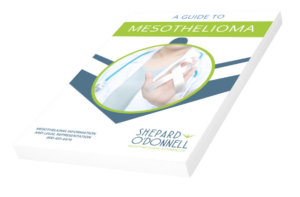Mesothelioma Legal Question: How Long Do I Have to File A Mesothelioma Lawsuit?
As another new year begins and we are all thinking about intentions and resolutions for the coming months, we’d like to add a specific and urgent task to your list: contact a lawyer as soon as possible if you or a loved one has been diagnosed with mesothelioma.
Mesothelioma is an aggressive form of cancer that, once diagnosed, often leaves victims and their families little time to put their affairs in order. Despite the fact that the disease has likely been developing for many years, once you learn that mesothelioma is the cause of the cancer, the clock starts running for you to initiate a potential legal claim.
Nothing can ease the pain of a mesothelioma diagnosis. However, obtaining fair compensation from those responsible for your injuries has the power to ensure your family’s financial security.
The Magic Number: 3 Years (Or More?)
One of Massachusetts’s most frequently asked mesothelioma legal questions is when a lawsuit can be filed. The statute of limitations for personal injury cases in the Commonwealth, including those involving mesothelioma, is three years. This means that you have three years from either 1) the date of your mesothelioma diagnosis, or 2) when you knew or reasonably should have known about the probable link between your diagnosis and prior exposure to asbestos, to file a claim.
It is important that you contact a lawyer as soon as possible after learning you or a loved one has mesothelioma, even if you think you may be outside of the three-year time limit. In certain circumstances, that time frame may have been tolled, or paused, as was the case with the statute of limitations during the COVID-19 pandemic. Your lawyer can tell you if the deadline in your case can be extended past the typical three-year mark. Be sure to contact an attorney intimately familiar with mesothelioma lawsuits in Massachusetts to get the best possible advice for your specific case.
We are happy to provide our honest opinion about whether you have a valid mesothelioma legal claim in Massachusetts, free of charge. Don’t worry if you don’t have your medical records or employment details at hand: we’ll help you obtain whatever documentation we need to build a strong case.
Talk to Your Doctor As Soon As Possible
We recommend talking to your doctor right away if you think you may have been exposed to asbestos at any point during your working years, particularly if you’ve worked in industries such as shipping, plumbing, construction, paper mills and others, or if you are a Veteran. Set up regular monitoring of your lung health, such as annual lung scans or other checks to ensure you spot potential symptoms of mesothelioma as early as possible. We urge you not to ignore the warning signs of mesothelioma which include:
- Shortness of breath
- Difficulty breathing
- Difficulty swallowing
- Chest pains
- Coughing blood
- Loss of appetite
- Sweating (profusely)
- Weight loss
Talk to your doctor right away if you experience any of these symptoms and be sure to let them know about your past asbestos exposure.
Remember: the earlier the diagnosis, the more treatment options may be available to you or your loved one, and the greater the likelihood of recovery.
If you do experience any of these symptoms, or have been recently diagnosed with mesothelioma, we also encourage you to talk to your family about your work history to begin putting the puzzle pieces together about when, where and how you may have been exposed to asbestos. Since the only known cause of this disease is asbestos exposure, it is important to establish and document that history, particularly if you plan to pursue a lawsuit. Let your loved ones know how you may have been exposed to asbestos, what employers you worked for, which job sites you worked at, what equipment you used and who your co-workers were. All of this information will be important to a successful legal claim and the sooner we begin building your case, the greater the likelihood you will be awarded compensation. Read more about what to do if a family member has been diagnosed with mesothelioma.
Think About Possible Secondary Asbestos Exposure
When asbestos dust settles into clothing, furniture, shoes, hair, car upholstery and elsewhere, it can be re-released into the air when disturbed. Because of this, some people have unknowingly exposed loved ones to asbestos at home, even if that loved one has never worked around asbestos themselves. Sadly, a simple welcome-home hug could send fibers into the air to be breathed in by family members.
Unfortunately, this unwitting transfer is the primary method by which many women and children were exposed to asbestos in the early to mid-1900s. We’ve seen first-hand the terrible suffering of one of our clients who developed mesothelioma as a result of doing her husband’s laundry over many years: the asbestos dust embedded in his clothing became dislodged as she handled the items and she then breathed in those toxic fibers. This was a devastating burden to bear for her husband; however, since they were able to put the pieces together of how she developed mesothelioma, they were able to receive substantial compensation for her injuries.
If you or a close family member worked around asbestos during their lifetime and has developed mesothelioma, we encourage you to think about whether you might be able to seek financial compensation for their suffering. Understandably, an overwhelming sense of guilt leads some people into denial, but rest assured, there was no way to know about the dangers of asbestos fibers if the companies didn’t tell you about them.
Companies that knowingly perpetuated the use of this harmful material for decades after it was known to be dangerous should be held accountable. It was their responsibility to warn purchasers and users about the true hazards, and to list the precautions that should be taken to fully protect against exposure to asbestos from their products. They didn’t and allowed hundreds of thousands of people to suffer.
Time Is Of The Essence
Many mesothelioma victims are successfully filing lawsuits in Massachusetts to get the compensation they deserve. However, in order to recover maximum financial awards for your asbestos-related injuries, it is important to file a claim as quickly as possible to ensure that your claim falls within the three-year statute of limitations, and that we have time to gather the evidence we need regarding your work history and potential exposure.
Call us today if you think you might have a mesothelioma legal claim and we will help you navigate the process. At Shepard O’Donnell, we have helped hundreds of individuals and their families get justice for their injuries, regularly obtaining settlements and verdicts in the millions. We are happy to offer you a free case evaluation and will tell you honestly if we think you have a viable claim.
My Parent Has Been Diagnosed With Mesothelioma. What Do I Do Now?
Practical Answers To Common Questions
Learning that your father, mother, or any family member, has been diagnosed with mesothelioma is devastating, made more so by the fact that it is a preventable disease for which there are few treatment options. In addition to shock, confusion and sadness, you are probably wondering how to deal with this new reality going forward while ensuring your loved one gets the best care and support possible.
While some questions are best answered in the doctor’s office, others are not and you may be at a loss to know what to do next. At Shepard O’Donnell, we have worked with many families in your situation and can offer some guidance about the weeks and months ahead. While preparing hundreds of successful mesothelioma lawsuits, we often act as a resource for our clients and offer support whenever we can.
Here are some of the most common questions we are asked:
Q: Can I Get Financial Help To Pay The Bills?
A: Investigate All Options, Including Filing A Lawsuit.
As a first step, educate yourself about all available programs and assistance, including VA benefits if your parent qualifies, and start the application process. This disease often requires aggressive intervention in the form of surgery, radiation, and/or chemotherapy and your parent will need care and support to help him or her through. While cost might not initially be your main concern, the bills will soon start adding up.
Insurance and other benefits may only cover a portion of your medical bills. We encourage you to contact a local attorney or firm, such as Shepard O’Donnell, to determine if you have a potential mesothelioma legal case.
Q: How Can I Help Build A Legal Case?
A: Talk To Your Parents About Their Work History Now.
We understand that your priority is educating yourself about the disease and treatment plan, but we also urge you to talk to your parent about how he or she might have developed mesothelioma. Since the only known cause of the disease is asbestos exposure, it is important to establish how and when that exposure occurred, particularly if you plan to pursue a lawsuit.
We encourage our clients to talk to their parents about their work history as soon as possible; unfortunately, once diagnosed, this disease progresses relatively quickly, and treatment and medications can impact memory and the ability to communicate later on. Ask questions about whether they remember working with asbestos, what employers they worked for, which job sites they worked at, what equipment or tools they may have used, who their co-workers were and whether they have contact information for anyone associated with that job. To successfully pursue compensation from companies that willfully ignored the dangers of asbestos, you will need to provide as much specific information as possible about your parent’s exposure. (If your parent is a military veteran, you can reassure him or her that we will not pursue damages from the military, rather, we seek compensation from the manufacturers of the asbestos-containing products themselves.)
Q: What Other Documents Should I Look For?
A: Gather Together All Important Information To See If Anything Is Missing.
In addition to collecting information about your parent’s detailed work history, there are a number of other documents you should start compiling and/or preparing. For example, does your parent have a current will and/or a living will? A designated health care proxy? Are bank accounts in both parents’ names? Is the house in both names? Unfortunately, the prognosis for this disease is often poor and having important documents at hand when you need them will ensure things run smoothly and quickly later on. Other paperwork to locate includes health and life insurance policies, banking information, social security information, and military records. Often overlooked, but also important, are passwords and PIN numbers for various accounts, and contact information for friends and family. Call us and we can help with these important documents.
Q: Do I Need to Worry About Getting Mesothelioma Myself?
A: Probably Not.
You may be wondering if you yourself should be concerned about developing this disease. There is no genetic or hereditary component to mesothelioma since it develops solely as a result of asbestos exposure. That said, there have been many cases in which individuals who were exposed at work unknowingly brought asbestos back into the home. While workers who have been in close contact with asbestos are at the highest risk, it is critical to let your doctor know as early as possible if there’s even a small chance you may have been exposed to asbestos. If you aren’t currently experiencing any symptoms, but are concerned about possible past exposure, ask your doctor to set up regular monitoring. However, keep in mind that not everyone who has been exposed to asbestos will get mesothelioma or other cancers.
If you or a loved one does develop mesothelioma through asbestos brought into the home, you too could have a case. For example, we were able to secure a significant settlement for a client who developed mesothelioma as a result of laundering the clothing of her husband, who worked at a facility that coated and cut asbestos paper for use in making gaskets.
Q: What Can I Do To Support Both My Parents?
A: Sometimes Little Things Go A Long Way.
Talk to the doctor to see how you and your family can keep your loved one as healthy and strong as possible, for as long as possible. This includes providing balanced meals to maintain a healthy weight so they are better able to tolerate treatment. The American Cancer Society has useful information about the importance of good nutrition during treatment. If preparing meals seems like a daunting task, there are several meal delivery services available in Massachusetts, including Community Servings whose mission it is to actively engage the community to provide medically tailored, nutritious, scratch-made meals to chronically and critically ill individuals and their families. We have also developed some recipes for healthy and nourishing smoothies that our clients enjoy.
Practical actions such as decluttering the house or bringing items necessary for daily living – including hobbies and diversions – onto one level, will be helpful in the long run. Identifying which supports may be required in the future and whether hospice or palliative care might be required are some things you can look into now to ensure peace of mind later. If possible, prepare for the future together so you can understand your parent’s goals and wishes for the end of life. Also, understand that each person’s stress, anxiety, and fear will manifest in different ways: some people retreat into themselves, some lash out. Remember not to take potential bad behavior personally.
While this is certainly a serious time, allow your parents permission to be happy during the last months. If they’re up for it, plan fun events and allow some time to laugh and enjoy life together.
Q: How Am I Going to Manage It All?
A: Be Sure To Take Care of Yourself, Too.
After the initial shock of the diagnosis, you are probably wondering what this means for your daily life. Your days are likely already full with work and other obligations such as driving the kids to practice, managing your own household and upholding various commitments. How will you find the time to deal with everything that needs to be done?
Talk to your employer about whether you qualify for some time off under the Family Medical Leave Act, or FMLA, to give you some breathing room. Above all, we urge you and all family members to take care of themselves: eat right, try to fit in some physical activity every day, get good quality sleep, and perhaps start a meditation or mindfulness practice. Don’t be afraid to ask for help from friends or extended family and consider joining a support group for mesothelioma victims, such as these in-person and virtual options offered through Brigham and Women’s Hospital in Boston. Or contact us and ask us to connect you with family members of mesothelioma victims that you can talk to about tips for coping with this difficult situation.
We Are On Your Side
You and your family are undoubtedly experiencing emotional stress and trauma as you deal with this painful time in your lives. Make sure you find an attorney for whom you are not just a number on a spreadsheet or a docket. We are responsive, compassionate, and sincere. If you have any other questions, we are ready to help you find answers.
At Shepard O’Donnell, we have helped hundreds of individuals and their families get justice for their injuries, regularly obtaining settlements and verdicts in the millions. We are happy to offer you a free case evaluation and will tell you honestly if we think you have a viable claim. Read more about the importance of hiring a local attorney.
During Asbestos Awareness Week, Let’s Remember Caregivers Too
Written by: Shepard Law Firm Staff
With Global Asbestos Awareness Week approaching (April 1–7), we want to not only raise awareness of asbestos, but also the effects that a diagnosis of lung cancer or mesothelioma has on the family and caregivers of someone with lung cancer or mesothelioma. Therefore, let’s use this week in April as a reminder to support the individuals who spend their time and energy caring for others.
When someone is diagnosed with an asbestos-related disease their family typically rallies around that person to provide support, comfort, and care. Caregivers tend to get wrapped up in caring for their loved one and don’t always take the time to take care of themselves and deal with their own grief and loss due to the diagnosis. A caregiver spends their time driving their loved one to appointments, making sure that their loved one is taking all of the correct medicines, eating properly, and is as comfortable as possible, all while maintaining a home, paying bills, and educating themselves and their family on their loved one’s diagnosis and prognosis. This is extremely taxing on any one person and caregivers may feel stressed out, alone, or depressed. As difficult as it seems, caregivers need to remember to take care of themselves too!
If you are a caregiver, remember to:
-
- Take Frequent Breaks: Although it may not seem possible to take breaks away from providing your loved one with your full attention, steal away time when you can. If someone comes to visit your loved one, do not feel that you have to entertain them. Take that time for yourself.
- Accept Offers of Help: When friends and family offer to help, they mean it! It’s difficult to know how to help in situations where someone has been diagnosed with a serious disease, so don’t be afraid to tell trusted friends and family what they can do to help out. It can be as simple as asking them to bring over a meal, driving your loved one to an appointment, or coming over and making you laugh. They will appreciate knowing how to help you and you will have some much needed help.
- A great tool that helps with this goal is a website like http://lotsahelpinghands.com/. This website helps you specify the assistance that you need and allows people in your circle of trust to sign up to provide that assistance for you. The site also provides you with a means to communicate directly with those in your private “community” to get information out.
-
- Exercise: Taking time to do something for yourself is important. Take a walk around the block to clear your head or take a class that you enjoy.
Create a Way to Get Information Out: Taking care of a loved one is a full time job and the constant calls asking for updates can be exhausting if you try to keep everyone informed. Create a way to update your friends and family without having to continually call each and every one of them. Options include:- Private group on Facebook: Setting up a private group will allow you to send private information to only those who you would like to have that information.
- Create a blog: A blog allows you to communicate with anyone that wants information on you and your loved one. They are easy and free to set up using the WordPress website – https://wordpress.com.
- Start a telephone tree: Give each person in your group a person to call when there is news. Call the first person on your list and ask that they call their contact person to share the news and contact the next person in line.
- Join a Support Group: There are many local support groups for caregivers which allow a caregiver to get the support that they need to continue on with their very difficult support role. Check with your local hospitals or see the list below:
- Brigham & Women’s Hospital, Boston, MA
- Massachusetts General Hospital, Boston, MA
- UMass Medical Center, Worcester, MA
- Bay State Hospital, Springfield, MA
- SouthShore, Norwell, MA
- Exercise: Taking time to do something for yourself is important. Take a walk around the block to clear your head or take a class that you enjoy.
At Shepard Law, we are fortunate to meet many wonderful clients and their supportive caregivers. We recognize that a diagnosis of mesothelioma doesn’t only affect the person being diagnosed with the disease. During this week, we wanted to take the time to thank the tireless caregivers that show such amazing strength, resilience, and compassion while taking care of their loved who have been diagnosed with lung cancer or mesothelioma.
If you or a loved one is an undergoing treatment for lung cancer or mesothelioma and would like to learn more about your rights please call us for a free, confidential consultation at (617) 451-9191.
Taking Care of Our Caregivers
Written by: Erika O’Donnell
With the holidays quickly approaching, we look forward to celebrating this special time of year with our loved ones but recognize that it is a difficult time of year for many of our clients and their families. A diagnosis of lung cancer or mesothelioma can be devastating to a family and the thought of future holidays without a loved one can certainly make the holiday season very difficult for the families of those who have been diagnosed with lung cancer or mesothelioma.
When someone is diagnosed with an asbestos-related disease their family typically rallies around that person to provide support, comfort and care. Loved ones are so wrapped up in caring for their loved one that they do not always take the time to take care of themselves and deal with their own grief and loss due to the diagnosis. A caregiver spends their time driving their loved one to appointments, making sure that their loved one is taking all of the correct medicines, eating properly and is as comfortable as possible all while maintaining a home, paying bills and educating themselves and their family on their loved ones diagnosis and prognosis. This can be extremely taxing on any one person and caregivers may feel stressed out, alone and depressed. As difficult as it seems, caregivers must take care of themselves!
Tips for Caregivers:
- Take Frequent Breaks: Although it doesn’t seem possible to take breaks away from your loved one that needs your full attention, steal away time when you can. If someone comes to visit your loved one, do not feel that you have to entertain them. Take that time for yourself.
- Accept Offers of Help: When friends and family offer to help they mean it! It is difficult to know how to help in situations where someone has been diagnosed with a serious disease so don’t be afraid to tell trusted friends and family what they can do to help out. Whether it is asking them to bring over a meal, to drive your loved one to an appointment or to come over and make you laugh, they will appreciate knowing how to help you and you will have some much needed help.
- Exercise: Taking time to do something for yourself is important. Take a walk around the block to clear your head or take a class that you enjoy.
Create a Way to Get Information Out: Taking care of a loved one is a full time job and as much as you may appreciate the constant calls asking for updates it can be exhausting trying to keep everyone informed. Create a way to update your friends and family without having to continually call each and every one of them. Options include:- Private group on Facebook: You could set up a private group which would allow you to send private information to only those who you would like to have that information
- Create a blog: A blog would allow you to communicate with anyone that wanted information on you and your loved one. They are easy and free to set up using the WordPress website – https://wordpress.com/.
- Start a telephone tree: Give each person in your group a person to call when there is news. Call the first person on your list and ask that they call their contact person to share the news and contact the next person in line.
- Join a Support Group: There are many local support groups for caregivers which allow a caregiver to get the support that they need to continue on with their very difficult support role. Check with your local hospitals or see the list below:
At Shepard Law we are fortunate to meet many wonderful clients and their supportive caregivers. We recognize that a diagnosis of mesothelioma does not only affect the person being diagnosed with the disease. During this holiday season we wanted to take the time to thank the tireless caregivers that show such amazing strength, resilience, and compassion while taking care of their loved who have been diagnosed with lung cancer or mesothelioma.
If you or a loved one is an undergoing treatment for lung cancer or mesothelioma and would like to learn more about your rights please call us for free, confidential consultation (617) 451-9191.










